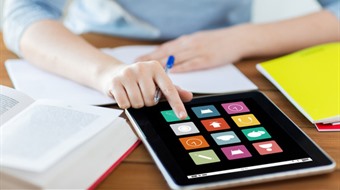Responsible Use of Technology & Social Media
September 13, 2023
Smartphones and devices are now indispensable tools for students and teachers to access, use, create and produce educational resources. Winnipeg School Division supports responsible use of technology to enhance the instruction and education process.
Social media is also assisting schools to improve community engagement and communications with students and their parents. WSD Teachers are using technology and social media as learning tools to collaborate with students and educators all over the world and are participating in lessons using 21st-century skills. WSD social media accounts created for official use are used by educators to inspire students, inform parents, communicate with colleagues, external resources and the community.
Make appropriate choices for a better online experience
Students benefit from online resources and gain in-depth knowledge about topics of their own interest. Below are suggestions to improve the online experience and get optimum benefits of web-based knowledge:
- Prioritize learning goals and plan for positive outcomes after each session. Maintain a record of your learning so that you can refer to it later when required.
You are making your OWN choices and always remember about the digital footprints being created—what you post online can have either a positive or negative impact on you and others—choose to make it positive. - Be cautious about your own safety—beware of unsafe websites and strangers, provide only necessary information about yourself. Understand the risks involved and implications of your reposts, likes, and comments.
Respect feelings of everyone and consider if your posts or actions could upset someone. Always remember the people online are real people even if they are not near us. - Be careful about intellectual property rights and copyrights. Copying or plagiarism is like stealing the ideas and work of others. Would you like it if any of your classmates take credit for your work?
- Do not download music, games or videos from illegal sources. Pirated content may have adult material, malware, and viruses which can harm your devices. When you use legitimate sites, the money goes to the people who made what you’re watching, playing or listening to.
- Before posting photos or videos of other people give a thought about permission, their feelings and is there anything which worries you. Would you share it if it is embarrassing for your friends, parents, grandparents or teachers to watch?
- Whether you are using your personal device or school’s device, be mindful to keep it safe from any theft, damage or destruction.
- Schools provide the internet as a platform for robust and comprehensive education, equitable access, diverse opportunity and supportive learning environment. Personal use in school hours makes the network slow and disrupts learning for other students.
- Social media must be used in a positive manner and avoid comments that are defamatory or harassing toward any person or institution.
- If you come across any inappropriate online behaviour or feel you are being bullied, then please seek your teacher’s or principal’s support. Harmful and offensive behaviour needs to be stopped.
- Students may refer to the Responsible Use of Technology and Social media policy for more detail about the policy and disciplinary measures for policy violation or unacceptable conduct or bullying by students or staff.
Unacceptable conduct may include the following but is not limited to:
- Abuse or bullying of another student or employee;
- Creating a negative impact on staff or student productivity or efficiency;
- Compromising confidential or proprietary information about, or related to, the division;
- Communicating information about other individuals whose individuals would reasonably expect to be private, without a legitimate and reasonable need for doing so;
- Engaging in real or reasonably perceived harassment and discrimination of staff and students, or any other third party;
- Communicating on behalf of the division, unless authorized, or required, by the staff member’s duties.
Bullying
Bullying is intended to cause fear, intimidation, humiliation, distress, or other forms of harm to another person’s feelings, self-esteem, body, or reputation or is intended to create a negative school environment for another person. The behaviour may be direct or indirect (through others) and may take place through any form of expression, including written, verbal (in the form of any language), physical or by means of electronic communication, including but not limited to, social media, text messaging, websites/blogs, or email. A person participates in bullying if they directly carry out bullying behaviour or intentionally assist/encourage the behaviour in any way.
- Social Bullying: includes harmful rumors, excluding/shunning, ignoring, getting others not to be friends with a child, using negative facial expressions and body language, such as eye rolling or turning a cold shoulder or symbolic gestures.
- Cyber Bullying: refers to bullying through electronic communication such as cell phones, digital cameras or other electronic or personal communication devices, including social media, text messaging, instant messaging, social media sites, websites, email or posting pictures, audio or videos on the internet.

 Responsible Use of Technology Brochure
Responsible Use of Technology Brochure Digital Citizenship Guide for Parents
Digital Citizenship Guide for Parents